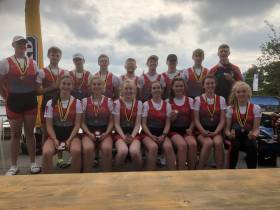Displaying items by tag: Sklibbereen
#Rowing: Castleconnell won the award as best junior club at Ghent International Regatta today. Their boys and girls reeled off a set of impressive results over the two days: on Sunday, the women’s junior pair won, while there were second places for the junior men’s four, pair and double and the junior women’s quadruple, which took on international-class Belgian opposition. The women’s under-23 double also won.
Saturday had been good for a number of Ireland clubs. Forty-one crews competed in the men’s junior single sculls – and Irish crews filled the first two places. Jack Butler of King’s Hospital won, with Rory O’Neill of Castleconnell just two seconds slower. The Castleconnell junior men’s four won and their women’s junior double of Niamh Kiely and Lauren O’Brien took second amongst 51 crews which competed.
Over the two days, other Irish crews to record wins included Skibbereen – which won both the women’s senior pair and the men’s junior 16 quadruple – and Commercial, which on Saturday won the junior women’s pair through Aoife Molony and Grace Healy and the junior women’s eight.
At Lee Regatta on Saturday, Shandon won the junior men’s 18 eight and Cork the women’s junior 18 eights.
Ghent International May Regatta (Irish interest, selected results)
Saturday
Men
Four – Junior: 1 Castleconnell.
Pair – Jun: 2 Castleconnell (J O’Donovan, C Mulready); 3 Castleconnell (B Frohburg, D Ryan)
Sculling, Quadruple – Jun 18: 3 Skibbereen (D Kavanagh, E O’Connor, F O’Reilly, F O’Regan). Jun 16: 1 Skibbereen (Kavanagh, O’Connor, O’Reilly, Regan).
Single – Jun: 1 King’s Hospital (J Butler), 2 Castleconnell (R O’Neill).
Women
Eight – Jun: 1 Commercial, 2 Carlow. Pair – Jun: 1 Commercial (A Molony, G Healy).
Sculling, Quadruple – Jun: 2 Castleconnell (N Kiely, L O’Brien, N Silke, S Byrnes).
Single – Under-23: 3 Castleconnell (P Silke).
Double – Jun: 3 Castleconnell (N Kiely, L O’Brien).
Single – Under-23: 2 Castleconnell (C O’Brien). Lightweight Single – Sen: 3 Skibbereen (O Hayes).
Sunday
Men
Four – Jun: 2 Castleconnell (B Frohburg, J O’Donovan, C Mulready, D Ryan)
Pair – Jun 18: 2 Castleconnell (O’Donovan, Mulready), 3 Castleconnell (Frohburg, Mulready), 3
Sculling
Double – Jun: 2 Castleconnell (J Desmond, R O’Neill). Jun 16: 3 Skibbereen (E O’Connor, F O’Reilly)
Women
Eight: 2 Commercial, 3 Carlow.
Pair – Sen: 1 Skibbereen (A McCarthy, N Casey), 2 Commercial (H O’Neill, R Morris). Jun: 1 Castleconnell (N Silke, S Byrnes); 3 Commercial (A Moloney, G Healy).
Sculling, Quadruple: 2 Castleconnell.
Double – U-23: 2 Castleconnell (C O’Brien, S Gilmore). Jun 16: 2 Carlow (S Scully, K Egan).
Single – Lightweight: 3 Skibbereen (O Hayes).





























































